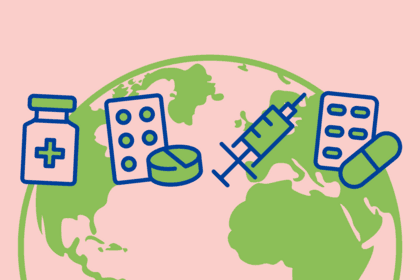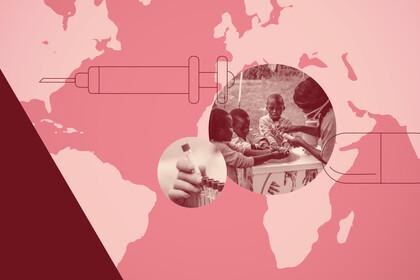
Towards a reformed research and development ecosystem for infectious disease
This discussion paper examines why the ecosystem of infectious disease research and development (R&D) fails to meet people's needs and sets out potential routes for reform and key areas for discussion.
This paper looks at different stages of the ecosystem — from research priority-setting, clinical trials and regulation, manufacturing and product availability and affordability — and identifies problems, challenges and possible areas for change.
Wellcome will engage stakeholders across the infectious disease landscape to gather feedback on the paper during summer 2023 with the aim of co-creating an equitable and sustainable vision for the future.
What we did
This paper sets out our understanding and assessment of the research and development ecosystem for infectious disease, based on engagement to date as well as desk-based research.
It highlights areas of the ecosystem that face significant problems and that we consider to be particularly relevant to political and policy intervention.
While it does not cover every issue, it focuses on areas where Wellcome has greater expertise and is particularly interested in receiving feedback from stakeholders to gain a better understanding of key problems and potential solutions.
What we found
According to the World Health Organization (WHO), infectious diseases account for a quarter of all deaths globally. Recent events such as Covid-19 and MERS, as well as the increasing threat of climate change, highlight the risk of emerging pathogens.
Despite significant progress made to tackle infectious diseases in recent decades, the current ecosystem for research and development does not support everyone that depends on it.
Fragmented markets and imbalances of power result in significant inequalities, especially for low- and middle-income countries, where the burden of disease is greatest.
An individual's ability to access life-saving products often depends more on economic and geographic circumstances than on actual need.
The factors involved are complex and it can be difficult to identify the root cause of the problems. However, there are recurring failures across the system, such as:
-
Empty pipelines or stalled research into products addressing major infectious disease threats, particularly those affecting low- and middle-income countries.
-
Barriers during clinical development and registration can result in slow product approval or products that are never approved in some locations.
-
Limited supply, logistical issues or high prices can make products that are available in some parts of the world inaccessible to affected communities.
These issues manifest differently depending on the disease and affect countries and communities in diverse ways.
Cholera is an acute diarrheal illness caused by bacterial infection that spreads through contaminated food and water. The World Health Organization has approved three oral cholera vaccines (OCVs) for use. Two of these vaccines have been made available through a global stockpile funded by Gavi. This includes vaccines for reactive campaigns to support outbreak response, as well as vaccines to run larger preventative campaigns in endemic areas to prevent outbreaks from happening.
After years of steady progress in reducing deaths from cholera, outbreaks of the disease surged across 30 countries in 2022. These outbreaks have been larger, longer and more deadly due to various factors such as conflict, population displacement and humanitarian crises, which contribute to inadequate access to safe water. Additionally, climate change is causing an increase in extreme weather events that can trigger outbreaks.
As a result, the demand for cholera vaccines is almost double the available supply. Countries have had to adapt by administering single doses rather than the recommended two doses to control outbreaks. However, there is uncertainty around the effectiveness of single doses in some populations.
Experts are still debating the best way to respond to ongoing outbreaks, particularly if the global community is to meet the goal of reducing cholera deaths by 90% by 2030.
A more robust and diverse manufacturing base for crucial products is needed, along with prevention and control approaches that enable consistent and predictable demand for manufacturers to respond to.
After considering the various and interlinked challenges and failures that exist within the research and development ecosystem for infectious disease, we have identified four potential areas for change:
Equitable and comprehensive research priority-setting
Research priorities are often driven by major research funders and the commercial interests of the private sector. It will increasingly be important to consider policy changes that could encourage a more balanced focus across different infectious diseases while still recognising the different incentives on different actors in the system.
Streamlined clinical trial and regulatory approaches
Efficiencies across the ecosystem must be evaluated to ensure smooth processes that enable products to reach people quickly while maintaining quality and safety. It will be increasingly important to consider the role of different trial methodologies in driving forward innovation and how to ensure strong regulatory capacity in all parts of the world.
Scale-up of geographically diverse and sustainable manufacturing capability
Manufacturing capabilities for many products are overly concentrated in certain parts of the world. This makes it difficult for smaller manufacturers to grow and establish diverse and geographically spread bases. The strength of a country’s manufacturing capabilities can be linked to its research and regulatory capabilities, which are part of a country-wide system that can help or hinder access to innovation. We believe that considering the location of manufacturing, especially complex manufacturing, is critical to drive equity and access over the next 20 years.
Centring access and affordability while incentivising innovation
Many innovations are inaccessible due to their high cost or are never brought to market because they lack commercial viability. Some organisations and partnerships have supported access to certain innovations, but these approaches do not work for everything. Currently, equitable access is not built into every stage of the product development process. There is an opportunity to consider the role of new partnership models, different industry business models and the role of philanthropy.
What we're calling for
We’re calling on global health stakeholders across the infectious disease ecosystem for their support to drive action and create change.
Provide feedback on the paper
We acknowledge our very specific and limited perspective of the challenges that exist within the current system, and that other stakeholders will have a better understanding of key problems and potential solutions.
That’s why we invited those working across the ecosystem – including funders, policymakers, governments, regulators, industry and research organisations, civil society and affected communities – to read and provide feedback on this paper and its key topics.
Our goal is to share the conclusions and takeaways from this process in a second paper. Originally planned for autumn 2023, this will now be published in early 2024 to allow us more time to effectively draw on the diverse perspectives to inform our next steps. We intend for this paper to set out a more definitive vision from Wellcome for the future of infectious disease research and development, informed by engagement with stakeholders, and in turn, inform Wellcome's advocacy priorities for the coming years.
About this paper
This paper was developed internally by Wellcome.
As a funder based in the Global North, we recognise our role in contributing to some of the inequities and systemic challenges that exist within the infectious disease research and development ecosystem. To address these imbalances, we want to be more transparent and inclusive in our thinking.
We acknowledge that we don’t have all the answers, so we aim to work with experts from various sectors, disciplines, and countries to build on this work – particularly representatives of communities most affected by infectious diseases. This paper is the first stage of this process.
Downloads
- Towards a reformed Research and Development (R&D) ecosystem for infectious disease
- Towards a reformed Research and Development (R&D) ecosystem for infectious disease: a Global Conversation event schedule
- Towards a reformed research and development ecosystem for infectious disease (French version)
- Towards a reformed research and development ecosystem for infectious disease (Portuguese version)
Contact us
For more information, contact Jeremy Knox, Head of Policy for Infectious Disease J.Knox@wellcome.org or Zoë Molyneux, Policy Lead, at Z.Molyneux@wellcome.org.

